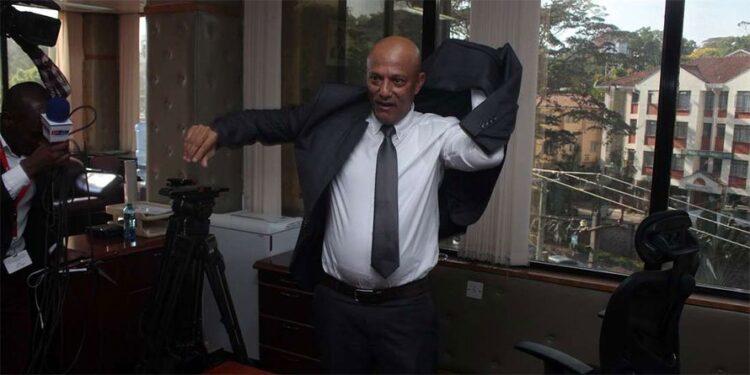Ideas & Debate
Rotich should stay the course in anti-graft war
Monday, June 10, 2019 19:41
By SAMUEL MARETE AND JOHNSTONE MWENDA |

Fairly soon, the Treasury Cabinet Secretary, Henry Rotich, will read the 2019/2020 Budget Statement, outlining the government’s proposals for expenditure in the upcoming financial year.
Last year, Mr Rotich outlined a number of proposals designed to achieve “the eradication of corruption”.
Broadly, these proposals included submitting the Public Procurement and Asset Disposal (PPAD) regulations to Parliament; the enforcement of the President’s Executive Order No. 2 of 2018 on the Procurement of Public Goods, Works and Services by Public Entities; and the strengthening of various institutions mandated to fight corruption, including the Ethics and Anti-Corruption Commission (EACC), the Office of the Director of Public Prosecutions (ODPP), the Asset Recovery Agency (ARA), the Financial Reporting Centre (FRC) and the Directorate of Criminal Investigations (DCI).
Some progress has been made in the interim. The Multi-Agency Task Team (MATT), for example, was established in June 2018. According to Attorney-General Paul Kihara, MATT has overseen the recovery of over Sh3 billion worth of assets between July 2018 and January 2019. Along with these efforts, the implementation of those proposals submitted by the Cabinet Secretary (CS) in his 2018/19 budget proposal would be a further important step in the war on corruption.
The Public Procurement and Asset Disposal Act, which was enacted on January 7, 2016, envisages a set of regulations that gives life to the Act. These regulations were not yet in place at the time of last year’s Budget Statement, and the CS pledged to submit them to Parliament in the financial year 2018/19.
Mr Rotich enumerated a number of valuable provisions that would be contained in the proposed regulations. These included the establishment of a common user agency to facilitate and manage the procurement of common items; the enhancement of the e-procurement platform to improve the efficiency, effectiveness, accountability and transparency of government procurement; provisions to facilitate prompt payment for performed contracts within 60 days; and provisions to enact a buy-Kenya-build-Kenya initiative.
Although these regulations have yet to be submitted to Parliament, the CS should maintain his commitment to have them enacted.
The regulations are in fact doubly important because without them, the nation is forced to rely on various regulations made under the Public Procurement and Disposal Act (2005), which was itself repealed by the current Act.
On June 28, 2018, President Uhuru Kenyatta issued Executive Order No. 2 of 2018, which required all ministries, departments and agencies (MDAs) to publish and publicise all procurement contracts on their websites, on the designated State tender’s portal (https://www.tenders.go.ke/website) and on tender notice boards.
In his 2018/19 Budget Statement, Mr Rotich further explained that MDAs were to publish the following particulars: names and designations of tender evaluation committee members; the name of the contractor/supplier awarded the tender; names of the directors of the awarded firm; the contract price and tender sum; and the contract period (including commencement and completion dates).
The public procurement information portal maintained by the Public Procurement Regulatory Authority (PPRA) shows that the detailed reporting envisioned by the President’s Order and by CS Rotich’s Budget Statement is missing.
For example, the names and designations of tender evaluation committee members have not been consistently listed; where provided, they are only listed as “Evaluator 1”, “Evaluator 2”, and “Evaluator 3”.
The portal itself could be enhanced by allowing sorting by contract dates and amounts, allowing searching and viewing of all contracts awarded to a particular contractor/supplier regardless of the State department supplied to, and by providing a snapshot of the major contracts by value in force at a given time.
INSTITUTION STRENGTHENING
The 2018/19 Budget Statement also envisioned the strengthening of State institutions instrumental in the war on corruption.
The ARA, for example, was to receive Sh161 million in budgetary support. This is an important institution because although incarceration of the perpetrators of economic crimes is important as a deterrent, from the citizen’s point of view, it is when stolen funds are recovered that the process of justice can be said to be complete.
A further Sh587 million was allocated to the FRC. Given that the FRC does not at present have an automated system to receive and analyse suspicious transactions reports, it is hoped that this and further allocations of funds will enable the agency to procure and successfully implement a world-class anti-money laundering system.
In conclusion, it can be seen that by staying the course as regards the anti-corruption provisions that he announced in last year’s budget speech, the Treasury CS will be able to enact and implement provisions and regulations that will prove very useful in the fight against corruption.
The government may also find expert advice and assistance useful in the effort to implement these initiatives.
Marete is a Manager and Mwendwa is a Senior Associate in PwC’s Business Recovery Services unit in the East Africa region.
Kenyan Business Feed is the top Kenyan Business Blog. We share news from Kenya and across the region. To contact us with any alert, please email us to [email protected]












